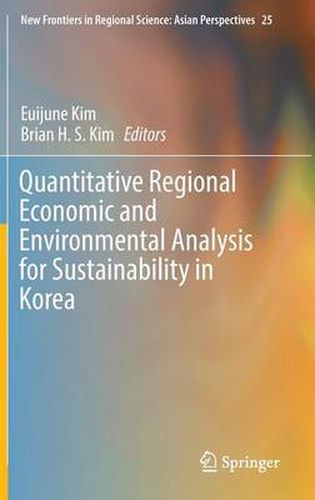Readings Newsletter
Become a Readings Member to make your shopping experience even easier.
Sign in or sign up for free!
You’re not far away from qualifying for FREE standard shipping within Australia
You’ve qualified for FREE standard shipping within Australia
The cart is loading…






This title is printed to order. This book may have been self-published. If so, we cannot guarantee the quality of the content. In the main most books will have gone through the editing process however some may not. We therefore suggest that you be aware of this before ordering this book. If in doubt check either the author or publisher’s details as we are unable to accept any returns unless they are faulty. Please contact us if you have any questions.
This book focuses on the application of newly innovated analytical tools for sustainable development on regional economic and environmental issues in Korea. With a range of case studies, the authors explore a series of theoretical models and empirical methods including spatial CCE Model, multiregional Input-Output and econometric analysis, logit model, contingent valuation method, GIS, sample selection model, machine learning technique, stochastic frontier analysis, and panel analysis. These models and methods are tailored to spatial development issues such as agglomeration, clustering and industrial innovation, human capital and labor market, education and R&D investments and economic resilience for regional economies and unexpected disaster, and natural resources for environmental markets. Quantitative Regional Economic and Environmental Analysis for Sustainability in Korea is of particular interest to policy makers and practitioners, as well as research scholars active in sustainability science.
$9.00 standard shipping within Australia
FREE standard shipping within Australia for orders over $100.00
Express & International shipping calculated at checkout
This title is printed to order. This book may have been self-published. If so, we cannot guarantee the quality of the content. In the main most books will have gone through the editing process however some may not. We therefore suggest that you be aware of this before ordering this book. If in doubt check either the author or publisher’s details as we are unable to accept any returns unless they are faulty. Please contact us if you have any questions.
This book focuses on the application of newly innovated analytical tools for sustainable development on regional economic and environmental issues in Korea. With a range of case studies, the authors explore a series of theoretical models and empirical methods including spatial CCE Model, multiregional Input-Output and econometric analysis, logit model, contingent valuation method, GIS, sample selection model, machine learning technique, stochastic frontier analysis, and panel analysis. These models and methods are tailored to spatial development issues such as agglomeration, clustering and industrial innovation, human capital and labor market, education and R&D investments and economic resilience for regional economies and unexpected disaster, and natural resources for environmental markets. Quantitative Regional Economic and Environmental Analysis for Sustainability in Korea is of particular interest to policy makers and practitioners, as well as research scholars active in sustainability science.